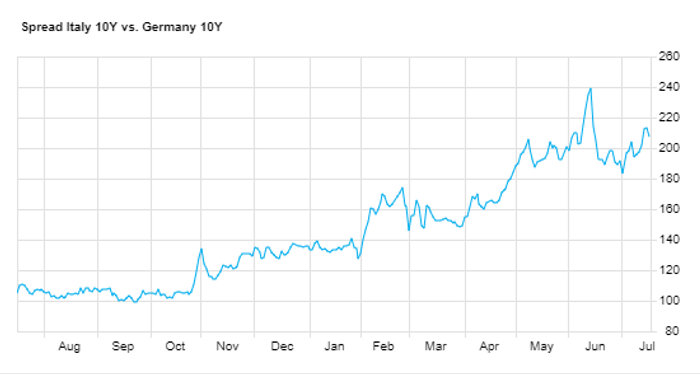When the European Central Banks delivers its first interest rate rise in more than 10 years on Thursday, it is also expected to provide detail on a measure it hopes will stop surging borrowing costs for some nations triggering another eurozone debt crisis.
Political turmoil in Italy, which may come to a head on Wednesday, may hasten its deployment. And embolden its detractors.
Highly indebted countries’ such as Italy and Greece have seen their government bond yields surge higher in recent months as spiking inflation in the Eurozone has forced the ECB to signal that the era of ultra-loose monetary policy is coming to an end. The strategy had included a number of market intervention tools designed to suppress such borrowing costs.
The spread between German 10-year bunds
TMBMKDE-10Y,
the regional benchmark, and equivalent duration Italian bonds
TMBMKIT-10Y,
has widened from around 100 basis points a year ago to 204 basis points. The similar spread for Greece
TMBMKGR-10Y,
over the same period has grown from about 100 basis points to near 216 basis points.

Germany/Italy 10-year yield spread. Basis points.
Source: FactSet
ECB President Christine Lagarde says she considers a portion of these spread expansions to be unjustified — a “fragmentation risk” which must be countered. It is the specifics of how the ECB will do this that is expected to be revealed on Thursday.
Analysts at UBS think the anti-fragmentation tool will differ from previous eurozone-wide market intervention mechanisms by being country focused and open ended. It may be “ad hoc and not featuring upfront quantitative limits….and as such offer the ECB a good degree of flexibility and discretion in its market interventions,” said the Swiss bank.
The prospect of the new tool has already helped the Italy-Germany spread contract from the 240 basis points high touched in mid-June.
But it remains elevated as investors contemplate the prospect of former ECB president Mario Draghi having to resign as Italian prime minister on Wednesday, should he not be able to reconcile recalcitrant members of his coalition.
Draghi is deemed fiscally responsible by the markets and the prospect of him no longer having his hand on the tiller will increase the anxiety over Italy’s sovereign debt.
“Political developments in Italy don’t help in this respect. If they trigger a political crisis, it will make it clear that the new tool, based on conditionality, will not be designed to deal properly with market-moving political developments” said rate and currency research strategists at Bank of America.
And the confluence of another ECB support mechanism and political shenanigans in Rome is not lost on those more fiscally responsible members of the eurozone who decry any central bank market interventions which come without economic reforms attached.
A report from Reuters on Tuesday, citing sources with direct knowledge of the ECB discussions, said any aid would be conditional on the recipient following eurozone budget rules.
“Anyone who wants money from the central bank out of turn must be prepared to provide something in return,” said Lars Feld, adviser to the German finance minister, according to Reuters.
